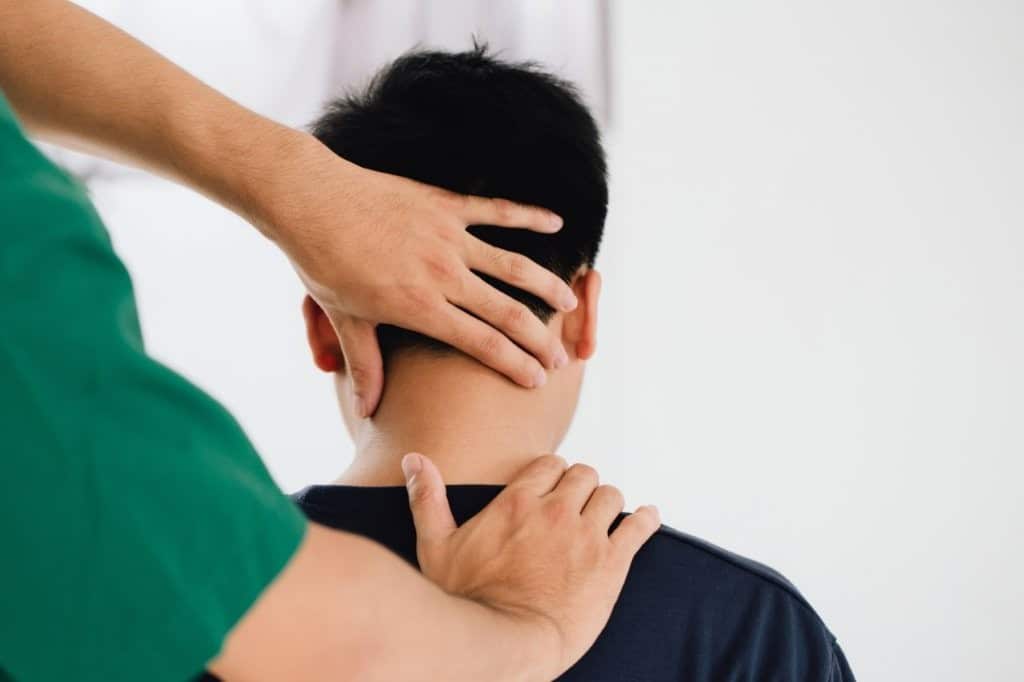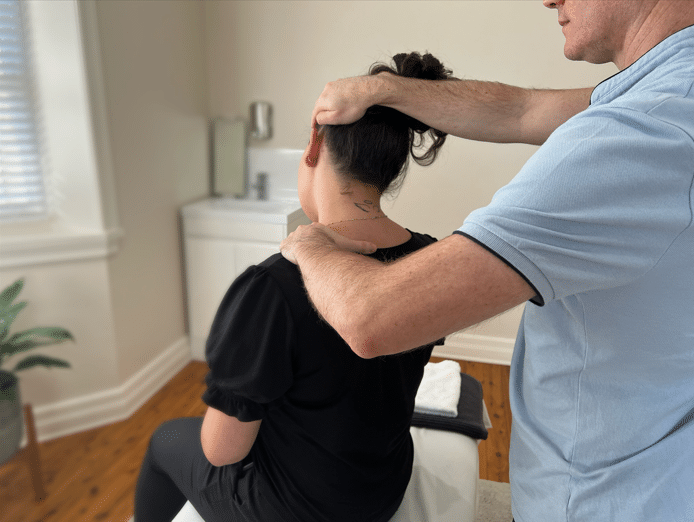- 02 9712 1736
- [email protected]
- 212 Great North Road, Five Dock, NSW 2046
- Open 7 days a week
Have you ever woken up with a stiff neck that makes turning your head feel impossible? You’re definitely not alone. Neck pain affects millions of people worldwide and can really impact your daily life. Understanding what’s causing your pain is the first step toward finding relief and getting back to feeling like yourself again.

If you spend hours looking down at your phone or computer, you may be experiencing “tech neck.” This is one of the fastest-growing causes of neck pain today. Your neck muscles exert extra effort to support your head when you gaze down at your device.
You might be surprised to learn that your head typically weighs between 4.5 and 5.5 kg. However, it feels like 22 kilograms to your neck muscles when you tilt it forward just 45 degrees to check your phone! Recent research shows that people spend over five hours a day on their phones, creating repetitive strain on the neck bones, nerves, and muscles.
Your tech neck symptoms might include:
Your posture throughout the day plays a huge role in how your neck feels. When you slouch or hunch forward, your neck muscles must work constantly to keep your head upright. This creates tension that builds up over time.
Common posture problems that affect your neck include:
Mental stress is a significant factor in neck pain, as psychological stress, anxiety, and depression are important risk factors. When you’re stressed, you might unknowingly tighten your neck and shoulder muscles. This muscle tension can lead to pain and stiffness that lasts long after the stressful situation ends.
You might notice that your neck pain gets worse during busy periods at work or when you’re dealing with personal challenges. This connection between your emotional state and physical symptoms is very real.
Whiplash is probably the most well-known neck injury. It happens when your head suddenly moves forward and backward quickly, often during car accidents, sports collisions, or falls. This rapid movement can damage the muscles, ligaments, and other soft tissues in your neck.
What makes whiplash tricky is that your symptoms might not show up right away. You might feel fine immediately after an accident, but pain and stiffness can develop hours or even days later.
Whiplash symptoms include:
As you age, the structures in your neck naturally change. Your cervical spine can deteriorate or degenerate, and conditions like osteoarthritis (wearing down of joint cartilage) and spinal stenosis (narrowing of spine spaces) can develop.
These age-related changes can cause:
The way you sleep can significantly impact how your neck feels in the morning. If your pillow doesn’t properly support your neck or if you sleep in an awkward position, you can wake up with pain and stiffness.
Your sleeping position matters because your neck needs to stay aligned with the rest of your spine throughout the night. Poor sleep alignment puts unnecessary strain on your neck muscles and joints.
While many cases of neck pain improve on their own within a week or two, you should consider seeing a healthcare professional if:

Your neck pain could stem from several different causes, with tech neck from device use being increasingly common in our digital world. Poor posture, stress, injuries like whiplash, age-related changes, and sleep issues all contribute to neck discomfort. The good news is that understanding what’s causing your pain puts you on the path to finding effective relief and prevention strategies.
Recent Medical Research Sources:

Scott has more than 20 years of clinical experience as a movement expert and musculoskeletal health professional. His thorough understanding of how pain affects your spine, joints, muscles, and total well-being is the result of significant academic study and many many years of clinical experience. Scott’s real interest in movement mechanics enables him to develop individualised care plans that summarise complex problems into clear, simple treatments, leading to quicker healing times. His friendly, attentive approach ensures that you not only comprehend but also feel supported throughout your treatment journey, allowing you to return to the things you like with restored confidence and vitality.


About
Five Dock Osteopathic & Chiropractic is located in Canada Bay, in Sydney’s Inner West. Servicing suburbs including Burwood, Croydon, Drummoyne, Five Dock, Haberfield, Concord, Abbotsford, Chiswick, Leichhardt, Wareemba, Russell Lea, Summer Hill, Strathfield.
Clinic hours
Monday, Tuesday, Thursday 7AM – 7PM
Wednesday, Friday 7AM – 6PM
Saturday 7AM – 2PM
Sunday 8AM – 2PM
Contact details